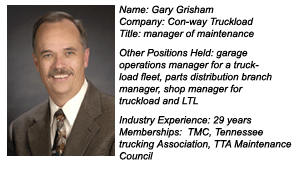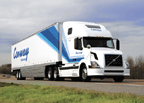Two years ago, the venerable LTL carrier Con-way turned it up a notch and added a truckload fleet.
In the process, many operational and maintenance parameters from the typical Con-way LTL profile had to be reset. Gary Grisham came on board to facilitate the changes and manage the maintenance and repair operation for Con-way Truckload. “We went from zero to 300 power units and 800 trailers in two years,” says Grisham, “and switched to our own truckload operation from sub service carriers pulling into our break bulk centers.” Nowadays, Grisham’s trucks fill long haul, time-sensitive lanes. “Our operation is very time critical,” Grisham says. “We service a lot of customers with every load. There are multiple shipments on every load but in every other sense we are a truckload carrier.”

Grisham’s immediate problem was to ensure his trucks were getting the maintenance they needed while not overburdening existing Con -way terminals. Because his background is in both LTL and truckload, Grisham had a handle on how this ought to work. A network of third-party vendors was set up to do maintenance and repair – in effect an entirely distinct maintenance operation from the LTL side was created. “We would like to use our LTL maintenance facilities more, but that is difficult,” Grisham says. “They are already very busy places.”
As maintenance manager of a fleet using third-party vendors a majority of the time, Grisham has an entirely different set of problems than others in his position who oversee in-house maintenance. “Our greatest difficulty is that we can’t put eyes on the equipment as often as we’d like,” Grisham says. In reality, one of the few times a truck gets the eyeball from a Con-way fleet manager is in a terminal at the end of its run, he says. The nature of the operation means that fleet managers are the primary point of contact with drivers. It is critical to communicate with a driver about maintenance issues when he drops a load at the end of his run. There are precious few other opportunities.
So it is that scheduled preventive maintenance is done on the road. “We use a plus or minus ten percent mileage window based on a 30,000 mile cycle to get PMs done,” Grisham says. Con-way Truckload has set up PM programs with truck stops across the country to facilitate regular maintenance and keep its trucks on schedule. Drivers can choose their spot as time allows any time inside that 10 percent window.

Grisham says handling a vendor network means working in a substantially more hands–on way. Since neither he nor his minions in the field see the trucks often, it is imperative to keep a tight rein on vendors. Ensuring quality means beginning from the beginning, Grisham offers. “We try to use vendors already known to our LTL operation,” he says. “In any case, it is important to have vendors with good reputations who have been in business a good long time.”
Road repairs are not typically done in a terminal or shop. Often vendors not in the maintenance network must be used and the same quality controls obtain here as in the truck stop maintenance aspect of the operation. When possible, Grisham’s trucks use vendors already used by terminals. Fleet managers coordinate much of this and do follow up with drivers and vendors to ensure problems have been resolved.
Grisham himself reviews every invoice vendors pump out. He looks forward to the day when there will be a software interface to facilitate this process, but right now he works from a pile of e-faxes. From this review he also does warranty over site for Con-way’s stand-alone warranty system.
Grisham points out that many fleets use vendors. But because Con-Way’s truckload operation is completely time critical and serves multiple customers with each load, its dependence upon vendors is much more critical to success. To keep freight moving on time, all the time, requires plenty of hands–on work at the administrative end and quality links among vendors, managers, drivers and Grisham himself. For the past two years it’s been working very well. But Grisham says the same over site used to keep the operation purring will be used to refine and make the maintenance program even more efficient in future.
Grisham’s situation is unique in that his maintenance program grew out of, but is not part of, the older Con-way LTL maintenance program. To get things right Grisham had to create a hybrid system that was not overly dependent upon the new fleet’s forebears, but not too distant to negate using that older system when necessary. Moving from an in-house program to an almost completely third-party effort meant forging new relationships and creating a place in existing networks that kept all parties looking favorably toward the others.
This was no small trick. But Con-way Truckload hit the ground running and lengthened its strides toward maintaining customer trust with on-time deliveries. Building and keeping customer trust meant building and keeping a trustworthy maintenance operation, one able to handle the pressures of a time critical operation, running, like all big truck fleets, under the draconian hours-of-service regulations. From all appearances, Grisham’s handiwork has paid off. Despite the pressures of HOS, critical on-time deliveries and the necessity to dovetail safety, service and maintenance, Con-way Truckload has strengthened the entire organization while building its identity in the marketplace.
